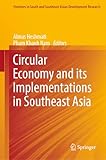Circular economy and its implementations in Southeast Asia
Material type: TextSeries: Frontiers in South and Southeast Asian Development Research (FSSADR)Publication details: Singapore Springer 2025Description: ix, 215 pISBN:
TextSeries: Frontiers in South and Southeast Asian Development Research (FSSADR)Publication details: Singapore Springer 2025Description: ix, 215 pISBN: - 9789819605385
- 330.9 HES
| Item type | Current library | Collection | Call number | Copy number | Status | Date due | Barcode | |
|---|---|---|---|---|---|---|---|---|
 Book
Book
|
Indian Institute of Management LRC General Stacks | Public Policy & General Management | 330.9 HES (Browse shelf(Opens below)) | 1 | Available | 009172 |
Browsing Indian Institute of Management LRC shelves, Shelving location: General Stacks, Collection: Public Policy & General Management Close shelf browser (Hides shelf browser)
Table of contents:
Front Matter
Pages i-ix
Download chapter PDF
Circular Economy and Its Implementations in the Southeast Asia
Almas Heshmati, Pham Khanh Nam
Pages 1-11
Waste Management and Recycling
Front Matter
Pages 13-13
Download chapter PDF
Circular Economy: Optimizing Waste Management—A Comparative Analysis of the European Union and ASEAN with Development Implications
Nguyen Phuong Dung, Vu Truc Hanh
Pages 15-35
A Systematic Review of E-Waste Estimation Methods and Models Used in SAARC and ASEAN Countries
Prajyot P. Gaonkar
Pages 37-59
Regulatory, Monetary and Financial Policy
Front Matter
Pages 61-61
Download chapter PDF
A Transmission Mechanism of Monetary Policy and Circular Economy in Vietnam
Tu Duong Quach, Tuan Minh Cao
Pages 63-82
Barriers of Law Regulation to a Circular Economy in SMEs to Integrate in a Sustainable Development Strategy
Ngoan Võ
Pages 83-97
International Experience on Financial Policy to Promote the Process of Collecting and Recycling Scrapped Vehicles and Lessons for Vietnam
Pham Hoang Ha, Pham Thi Thu Hong
Pages 99-111
Electronic Banking Fraud Prevention in Vietnam in the Context of a Circular Economy
Ha Le Thuy
Pages 113-125
Circular economy transition and its implications for sustainable development
Front Matter
Pages 127-127
Download chapter PDF
Closing the Loop: How Energy Efficiency Labeling Supports Circular Economy Goals
Mahirah Kamaludin, A. A. Azlina, Awang Noor Abd Ghani, Zaiton Samdin
Pages 129-147
Impact of Climate Change on Circular Economy Development and Ensuring Human Rights in Vietnam
Dang Thi Ha, Tran Thi Dieu Ha
Pages 149-167
EU’s Legal Framework for Secondary Raw Materials and Recommendations for Vietnam: Toward Sustainable Resource Management and Circular Economy
Huynh Phan Nhu Ngoc, Nguyen Ngoc Phuong Dinh
Pages 169-199
Exploring the Ambitions and Needs of Small and Medium-Sized Enterprises in the Transition to the CE in Vietnam
Thanh Cong Nguyen, Timber Haaker
Pages 201-215
[https://link.springer.com/book/10.1007/978-981-96-0539-2]
This edited volume explores the implementation of the circular economy (CE) in Southeast Asia, a densely populated region with a significant share of global production. It examines the region’s transition from a linear to a circular economy, providing a comprehensive overview of CE applications across various parts of Southeast Asia. The book offers unique and empirical insights into the approaches, methods, laws, and policies that facilitate the transformation to a CE. It highlights how recent research, trends, and attitudes can be practically oriented towards sustainable development. By linking environmental theory with practice, the book provides practitioners with a deeper understanding of CE and the challenges involved in its implementation.
A timely and practical guide, this book is essential for sustainability researchers and policymakers in Asia striving to achieve CE and sustainable development goals. It presents an up-to-date picture of Southeast Asia’s fast-growing economy, showcasing the region’s heavy investment in development infrastructure and cooperative efforts towards environmental sustainability. Authored by professionals with deep insights into the region’s economy and development potential, the chapters offer empirical, research-based perspectives on recent economic trends. This volume fills a crucial knowledge gap regarding Southeast Asian economies, their environmental conditions, and development potential. It also guides emerging economies like Vietnam in sustainable development, helping them avoid the pitfalls of environmental missteps in production, resource utilization, and consumption.
(https://link.springer.com/book/10.1007/978-981-96-0539-2)
There are no comments on this title.







